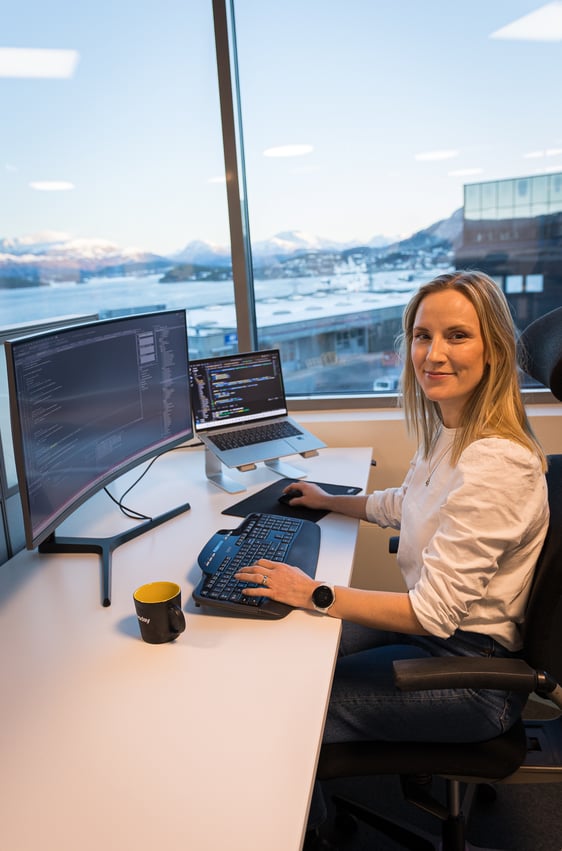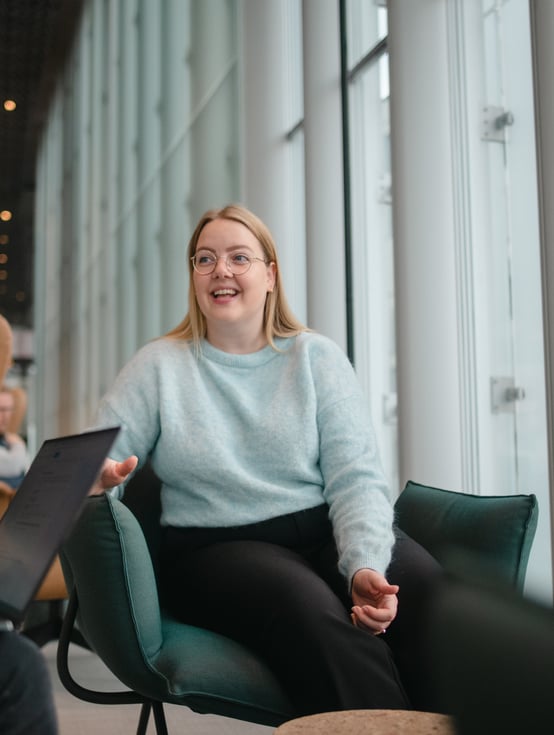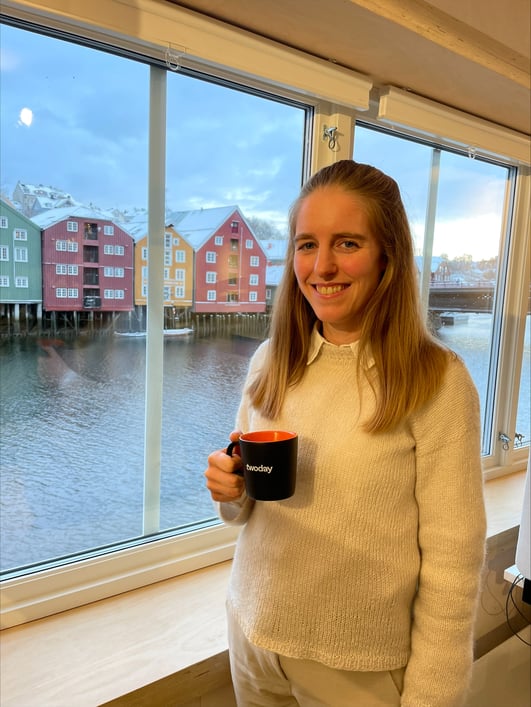The journey to the tech industry

Varied dreams
As Marit Runde, Kristin Wahl Hareide, and Anne Holst-Dyrnes reflect on their childhood aspirations, they recount diverse dreams and interests.
Marit initially aspired to work in childcare, yet her enduring passion for mathematics led her to self-teach programming at university, igniting her interest in a career in technology.
For Kristin, it was somewhat expected that she would end up where she is today. Exposed to technology from an early age, she learned to assemble her PC using parts her father brought home from work. Eventually, she learned to develop her own website using HTML and CSS, and since then, she has known that this was something she wanted to pursue.
Anne, on the other hand, envisioned careers in teaching and medicine during her formative years. As a natural problem solver, transitioning to the technology industry after completing her education felt like a seamless fit.

For Kristin Wahl Hareide, it was somewhat inevitable that she would end up in the technology industry.
The path to technology
All three studied at NTNU and look back on their study years as exciting and educational.
Kristin earned a master's degree in computer engineering, completing an integrated 5-year program. She describes it as a demanding program with a wide range of subjects and a high workload.
-In my fourth year, I spent time as an exchange student in Singapore, and it was an amazing experience!
Marit studied physics and mathematics. She also took the opportunity to try something new and spent a year studying abroad in Edmonton, Canada.
Anne shares Marit's academic background but with a focus on technical physics. She was in Munich in her fourth year, and after completing her master's degree, she took an extra year of elective studies in various mathematics and computer science subjects.
-When I finished my master's, I felt a desire to learn more about computer technology. Therefore, I took an extra year where I could choose the subjects I was most interested in, and it turned out to be a great investment! Many of the subjects I took that year have been very useful to me since then.
Transitioning to the workforce
Entering the workforce post-graduation can be a significant adjustment. When asked about the time after their education, they recall it as a challenging yet fulfilling period. They look back on a supportive environment with good colleagues and valuable experience with various technologies and projects.
All three participated in twoday's trainee program, Nytt Krutt. Good mentors, secure frameworks, and experiencing early responsibility and trust made it an experience they cherish being part of.
-As a trainee at twoday, I was thrown into it, and being "hands-on" in projects is a very effective way to learn, says Marit.

Anne Holst-Dyrnes applies much of what she learned during her studies in her everyday work life.
What does a typical workday look like?
For all three, a typical workday is characterized by variety From planning and meetings to coding and needs assessment, their days are dynamic. Marit works at the twoday office in Trondheim, while Kristin works in Ålesund and Anne in Oslo.
Marit manages her schedule independently, ensuring tasks are prioritized effectively. She is responsible for the quality her team delivers, which means, among other things, that she must plan which tests to conduct before what they create can be used.
Kristin adds that each day also consist of a lot of coffee and collaboration with skilled and pleasant people.
-My days can include everything from coding, planning, customer meetings, personnel follow-up, and recruitment events.
Anne juggles roles as a developer and team leader, overseeing projects and providing support to her team. This means she has her own subprojects and development tasks, as well as overseeing the rest of the team and assisting them where she can. Other tasks she often must solve during a day are troubleshooting and debugging code, maintenance tasks, or planning new subprojects. Anne works in data analytics, which means her areas are data platforms, data capture, and data modeling.

Marit Runde is confident that she will continue to work in the technology industry for many years to come.
Development opportunities
Continuous growth is essential for having the opportunity to develop. Marit mentions that both technology and our needs are constantly changing, so new challenges constantly arise. And challenges provide good opportunities for development, she points out.
Kristin adds that there is always room to try new roles and technologies, and that both provide broad experience. Trust, a key factor in development, was evident early in Anne's career.
-I received a lot of trust from my colleagues early in the projects I was involved in, which allowed me to take control of processes and tasks and have the overarching role that I enjoy.
All three highlight that a strong professional environment and skilled colleagues contribute to them constantly challenging themselves and others, something they greatly appreciate. When asked where they see themselves in ten years, they all find it difficult to answer. Marit envisions herself still immersed in technology, hoping for an inspiring workplace environment. Kristin aims to pioneer new technologies and problem-solving approaches. Anne embraces opportunities as they arise, driven by her passion for exploration and motivation.
Tips for aspiring technologists
Anne has only one thing to say, and that is "do it!". Marit suggests embracing technology for its varied opportunities and tasks. Find something that engages and interests you, and become good at it, is Marit's advice. Kristin wants people to realize that technology is not just one thing, but many different things.
-There is no defined box you must fit into, and for technology to work for everyone in the future, it must also be developed by everyone. We need various types of people to be involved and motivated to drive technology forward.
All three encourage curiosity, engagement, and the ability to embrace change. Their stories serve as a reminder to be open to the many opportunities that the technology industry has to offer. It is an industry full of challenges and exciting opportunities!
Would you like to join twoday? We are always looking for more good colleagues! Take a look at our vacancies here.
You might also like
No related content